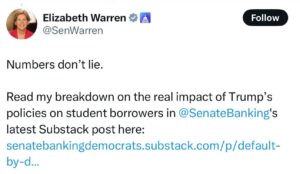Senator Elizabeth Warren took to Twitter with a blunt message: “Numbers don’t lie.” Linking to a detailed Substack post, Warren laid out how Donald Trump’s policies and Republican decisions in Congress are making life financially unbearable for millions of Americans—especially those with student loans.
Since the end of the COVID-era student loan pause in October 2023, nearly 9 million borrowers have missed payments. That’s 40% of those required to resume repayment. Once the federal grace period ended in October 2024, delinquencies spiked across the board. More than 5.6 million people fell behind on their loans in early 2025, with older borrowers hit hardest.
Warren highlighted how credit scores have taken a nosedive—2.4 million borrowers saw their scores drop more than 100 points, pushing them out of traditional lending options. Many now face denied loan applications, steeper interest rates, and even job rejections, as nearly half of U.S. employers now run credit checks.

She also warned that Trump’s new “Big Beautiful bill” could wipe out affordable repayment options entirely. The GOP-backed plan would force families to cough up an extra $400 a month, gutting their budgets and pushing even more Americans into default.
Meanwhile, the GOP is also targeting the Consumer Financial Protection Bureau—an agency that has historically held student loan servicers accountable and protected borrowers from shady practices. Without it, there’s little standing between struggling borrowers and predatory lenders.
The broader impact? Morgan Stanley estimates that resumed student loan payments alone could cost Americans $1 billion to $3 billion each month and trim up to 0.15 points off U.S. economic growth this year. If Trump’s legislation passes, it could remove another $40 billion from consumer spending in just the first year.
Warren’s post wasn’t just about pointing fingers. It’s a warning—and a call to action. She’s urging Congress to prioritize working families and student borrowers, not billionaires and corporations. According to her, there’s still time to avoid an economic disaster—but not if the current policies stay in place.


![Justin Bieber Impersonator Fools Las Vegas Nightclub Before Getting Permanently Banned [Video] - Baller Alert Justin Bieber Impersonator Fools Las Vegas Nightclub Before Getting Permanently Banned [Video]](https://balleralert.com/wp-content/uploads/2022/02/GettyImages-1235241382-scaled.jpg)
